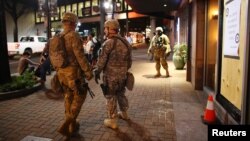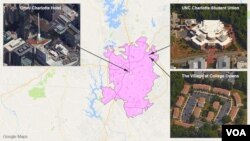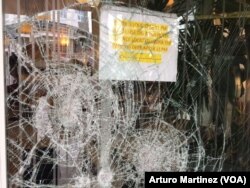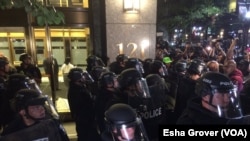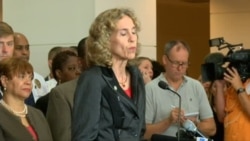Family members of Keith Lamont Scott, the black man shot to death by police Tuesday in Charlotte, North Carolina, said Thursday that they had seen two police videos of the shooting and could not tell what, if anything, was in Scott's hands when he was shot.
The death led to a third night of demonstrations Thursday, with protesters demanding the release of the video, along with calls for an end to police violence against African-Americans.
Charlotte-Mecklenburg police also told reporters that a man shot during Wednesday night's protests, Justin Carr, 26, had died of his injuries. Police said he was shot outside an upscale hotel in Charlotte's "uptown" neighborhood where the violence was centered.
Scott's family said the video showed Scott walking calmly backward with his hands by his sides. Police said he had a gun; his family said he was unarmed and might simply have been carrying a book that he was reading.
Family seeks video release
Justin Bamber, the family's attorney, told reporters Thursday evening that the family wanted the video released to the public immediately. But Police Chief Kerr Putney said he had no plans to release the video.
Controversy over the shooting, over whether Scott was armed when he was shot and over public access to the video sparked two nights of violence this week in North Carolina's largest city, a hub for banking and other commerce.
On Thursday, some protesters wore masks over their noses and mouths in case police deployed tear gas. They carried signs saying "Know Justice, Know Peace," "The People Versus the State" and "Stop Killing Us."
The crowd was a mix of races — African-Americans, whites and Hispanic people, some of whom carried signs saying, "Latinos say black lives matter." As night fell, more and more joined the march.
City officials said there were no plans to impose a curfew, but North Carolina Governor Pat McCrory, a former mayor of Charlotte, declared a state of emergency and warned that police would arrest lawbreakers.
"We cannot tolerate any type of violence ... or destruction of property," he said.
McCrory also said he had not changed his mind about a law he recently signed that will tighten restrictions on the release of police videos starting next month.
Earlier Thursday, Charlotte-Mecklenburg Police Chief Kerr Putney told reporters that releasing police footage of the shooting could undermine the ongoing investigation. He said he would release the video publicly only when he thought there was a "compelling reason" to do so.
Police said officers were looking for someone else when they saw Scott come out of a car with a gun, and that the officer fired after Scott ignored warnings to drop the weapon.
Witnesses said Scott had his hands in the air.
The shooting of Carr on Wednesday apparently occurred after protesters clashed with police in riot gear and the demonstration turned violent.
Officers fired tear gas to disperse the crowds; some people smashed store windows and set small fires in the streets.
Stay home, workers told
In response to the violence, three of the city's largest employers — Duke Energy, Bank of America and Wells Fargo — told their employees to stay at home Thursday, leaving streets eerily quiet. But businesses were open on Trade Street, epicenter of the violence earlier this week.
National Guard vehicles were assigned to assist police with security, while the number of police officers on foot patrol near the protest scene was scaled back.
The North Carolina branch of the American Civil Liberties Union called for the swift release of all footage related to Tuesday's shooting.
In a statement, Executive Director Karen Anderson said, "In the interest of transparency and accountability, and particularly in light of conflicting accounts about the shooting, the Charlotte-Mecklenburg Police Department should quickly release any and all footage it has of the events leading up to the shooting, as well as the shooting itself."
The president of the NAACP's Charlotte-Mecklenburg branch, Corine Mack, also called for the public release of the footage, saying it would bring transparency to the investigation of Scott's killing.
"It really doesn't matter if he had a gun," Mack said, citing North Carolina's Second Amendment right to openly carry guns without a permit. "Showing he had a gun doesn't prove he was guilty of anything."
Day 3 Protests, Charlotte, North Carolina
The city government initially said someone was killed Wednesday night when shot by another civilian, not police. However, it later said that person was critically injured.
Charlotte's police department said four officers were also hurt, but none had life-threatening injuries.
Nine people were injured Wednesday and 44 were arrested during the second night of protests. On Tuesday, about 24 people were injured, including 16 police officers.
Mayor Jennifer Roberts defended her decision not to seek emergency help sooner on Wednesday evening, noting the city had been calm during the day.
The U.S. Justice Department was sending a group of trained peacekeepers to Charlotte to help resolve conflicts. The agency's head, Attorney General Loretta Lynch, urged citizens Thursday to choose a path of reconciliation.
"Too many times we've allowed ourselves to be pulled down the easy path of blame and accusation rather than the harder path of empathy and understanding. Let us choose that path," Lynch told reporters.
WATCH: Charlotte Mayor Jennifer Roberts on investigation transparency
The Congressional Black Caucus condemned the latest shooting.
"Enough is enough. One is too many," Chairman G. K. Butterfield told reporters Thursday. "The federal government, including the federal branch and the legislative branch, must place the full weight of the federal government behind the elimination of unlawful police shootings."
The incident in Charlotte was the latest in a long string of police shootings that have highlighted the use of force by officers, particularly against African-Americans.
Shootings have often been followed by protests calling for police reforms and justice for those killed by officers. In many cases, the demonstrations have been peaceful, but violence like that seen in Charlotte has added to the debate about how people can best speak out against what they believe is wrong and the way police balance doing their jobs with allowing legally protected expression.
President Barack Obama spoke by phone Wednesday with Roberts and Mayor Dewey Bartlett of Tulsa, Oklahoma, where on Friday a white officer killed a black man.
The White House said all three leaders insisted any protests must be calm, and the president offered any assistance necessary to both cities.
An attorney for Betty Shelby, the Tulsa police officer who shot Terence Crutcher, 40, said Shelby feared for her life and fired when Crutcher reached through a window into his car.
On Thursday, prosecutors filed first-degree manslaughter charges against Shelby, who is white, saying in court documents that the officer "reacted unreasonably."
Crutcher's family said video of the incident showed that the window was closed and that he had his hands on the car to show he had no gun.




